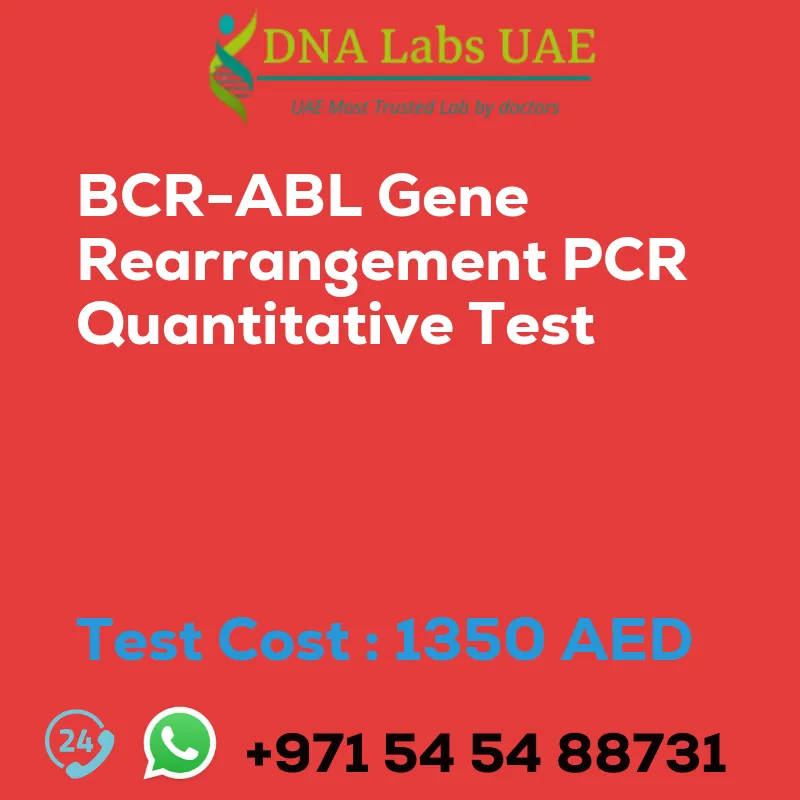BCR-ABL GENE REARRANGEMENT PCR QUANTITATIVE Test
At DNA Labs UAE, we offer the BCR-ABL GENE REARRANGEMENT PCR QUANTITATIVE Test. This molecular diagnostic test is used to detect and quantify the presence of the BCR-ABL fusion gene in patients with certain types of leukemia, including chronic myeloid leukemia (CML) and a subset of acute lymphoblastic leukemia (ALL).
Test Details
The BCR-ABL gene rearrangement PCR quantitative test uses real-time PCR technology to amplify and detect the presence of the BCR-ABL fusion gene in a patient’s blood or bone marrow sample. This fusion gene is created when parts of the BCR gene on chromosome 22 and the ABL gene on chromosome 9 are rearranged. The resulting BCR-ABL tyrosine kinase protein is responsible for the uncontrolled growth and division of abnormal white blood cells seen in CML and some cases of ALL.
The test provides a quantitative measurement of the level of BCR-ABL gene expression, which can be used to monitor the response to treatment and assess the risk of disease progression. The results are reported as a ratio of BCR-ABL to a reference gene, such as ABL or GUS. A higher ratio indicates a higher level of BCR-ABL expression, which may indicate a more aggressive disease or a poor response to treatment. Conversely, a lower ratio indicates a lower level of BCR-ABL expression, which may indicate a better response to treatment or a lower risk of disease progression.
Test Components and Price
The BCR-ABL GENE REARRANGEMENT PCR QUANTITATIVE Test is priced at 1350.0 AED. The sample condition required is 5 mL (3 mL min.) of whole blood or bone marrow in 1 Lavender Top (EDTA) tube. The sample should be shipped refrigerated and should not be frozen. The report will be delivered daily by 9 am, and the results will be available on the same day.
Doctor and Test Department
This test is performed under the supervision of an Oncologist or Hematologist. The test is conducted in our Molecular Diagnostics department.
Pre Test Information
No special preparation is required before undergoing the BCR-ABL GENE REARRANGEMENT PCR QUANTITATIVE Test.
Importance of the Test
The BCR-ABL GENE REARRANGEMENT PCR QUANTITATIVE Test is an essential tool in the management of patients with CML and some cases of ALL. It is used for diagnosis, monitoring treatment response, guiding treatment decisions, and detecting minimal residual disease (MRD) – the presence of a small number of cancer cells that may remain after treatment.
| Test Name | BCR-ABL GENE REARRANGEMENT PCR QUANTITATIVE Test |
|---|---|
| Components | |
| Price | 1350.0 AED |
| Sample Condition | 5 mL (3 mL min.) whole blood \/ Bonemarrowin 1 Lavender Top (EDTA)tube. Ship refrigerated. DO NOTFREEZE. |
| Report Delivery | Sample Daily by 9 am; Report Same day |
| Method | Real Time PCR |
| Test type | Leukemia |
| Doctor | Oncologist, Hematologist |
| Test Department: | MOLECULAR DIAGNOSTICS |
| Pre Test Information | No special preparation required |
| Test Details |
The BCR-ABL gene rearrangement PCR quantitative test is a molecular diagnostic test used to detect and quantify the presence of the BCR-ABL fusion gene in patients with certain types of leukemia, specifically chronic myeloid leukemia (CML) and a subset of acute lymphoblastic leukemia (ALL). The BCR-ABL fusion gene is created when parts of the BCR (breakpoint cluster region) gene on chromosome 22 and the ABL (Abelson) gene on chromosome 9 are rearranged. This fusion gene produces a protein called BCR-ABL tyrosine kinase, which is responsible for the uncontrolled growth and division of abnormal white blood cells seen in CML and some cases of ALL. The BCR-ABL gene rearrangement PCR quantitative test uses polymerase chain reaction (PCR) technology to amplify and detect the presence of the BCR-ABL fusion gene in a patient’s blood or bone marrow sample. It provides a quantitative measurement of the level of BCR-ABL gene expression, which can be used to monitor the response to treatment and assess the risk of disease progression. The test results are reported as a ratio of BCR-ABL to a reference gene, such as ABL or GUS. A higher ratio indicates a higher level of BCR-ABL expression, which may indicate a more aggressive disease or a poor response to treatment. Conversely, a lower ratio indicates a lower level of BCR-ABL expression, which may indicate a better response to treatment or a lower risk of disease progression. The BCR-ABL gene rearrangement PCR quantitative test is an important tool in the management of patients with CML and some cases of ALL. It is used to diagnose these diseases, monitor treatment response, guide treatment decisions, and detect minimal residual disease (MRD) – the presence of a small number of cancer cells that may remain after treatment. |








